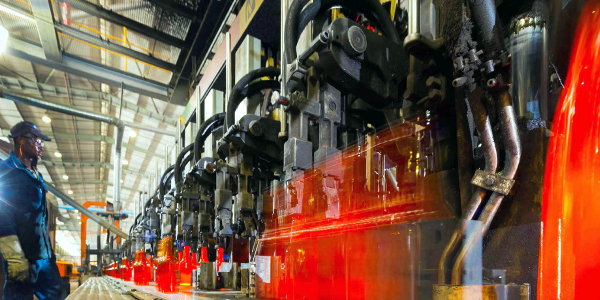Packaging company Nampak doing well in Nigeria, pity it can’t get its money out

According to Nampak’s half-year results, it had R1.5bn (over US$96m) in cash tied up in Nigeria and Angola at the end of March and were unable to convert this into US dollars as a result of foreign currency shortages.
On Wednesday, South African packaging company and the continent’s largest beverage-can manufacturer, Nampak, released its half-year results for the period ending 31 March 2016. It revealed its trading profit from the rest of the continent (outside of its home market South Africa) had grown, now contributing 47%, up from 38% in 2015.
In Nigeria, Africa’s largest economy, Nampak’s can-packaging division, Bevcan Nigeria, saw its market share expand and operating profit increase.
But despite this strong performance, Nampak announced it would not pay an interim dividend to shareholders.
Part of the reason is the group is struggling to get its profits out of Nigeria and Angola due to severe foreign-exchange constraints. According to the company it had R1.5bn (over US$96m) in cash tied up in the two markets at the end of March and were unable to convert this into US dollars as a result of foreign currency shortages.
“[Nampak] is earning money in those countries but can’t take it out to either buy raw materials in foreign currency or to pay down some of their debt, etc,” says Mark Hodgson, industrial and corporate governance analyst at Avior Capital Markets.
“So they are much more restricted in how they manage their businesses. It is a lot tighter, and they are not finding things very easy at the moment.”
Since March last year, the Central Bank of Nigeria (CBN) has pegged the local currency at just below 200 naira to the US dollar. However, the collapsed oil prices have decreased export revenue, leading to a scarcity of dollars in the country. In January the CBN halted dollar sales to foreign operators and the naira has since plummeted to 350 to the dollar on the black market.
According to Nampak’s half-year results, the company was able to access foreign exchange in Nigeria and Angola to pay for 60% of foreign supplier invoices.
“The other 40% they have to fund themselves through dollars that they are actually paying outside of the country. To keep operating they have got to actually have more dollars outside the country,” notes Hodgson.
Last week the CBN’s governor Godwin Emefiele hinted that Nigeria would adopt a more flexible foreign-exchange policy. Uncertainty over a devaluation of the naira has negatively impacted investor confidence and Nigeria’s National Bureau of Statistics reported that capital inflows in the first quarter of this year have plummeted to $710.97m – a year-on-year decline of 73.79% and a near 90% drop from its peak in the third quarter of 2014.
Hodgson says it is likely that devaluation could take place soon, although the exchange rate will probably still be controlled.
“It’s unlikely that they will just let [the naira] free fall. They will probably try and management it in the way that will help it create some liquidity, but it will still be artificial.”
He notes that struggles with foreign-exchange constraints do dampen Nigeria’s investment prospects. “Especially if you have raised dollars to invest and put up a plant there, and then you can’t essentially service that debt. It does make it far less attractive.”
While a naira devaluation might create liquidity in the market, companies also risk seeing their current investments in Nigeria devalue. A devaluation of the kwanza by Angola’s central bank in January saw the currency fall the most since September 2001, and cost Nampak R114m ($7.3m) for the half year period.
Concerns over a similar devaluation in Nigeria could further deter investment.
“If you are in a situation where you almost need to bring more money in to invest more, then you are also going to be nervous about [the naira] being at an artificially high rate. You want to have some certainty that you are bringing in money at the right rate and [will be] worried that you are going to take it out at a very weak rate,” continues Hodgson.
“So it creates lots of uncertainty and stress and probably makes things grind to a halt in terms of… less happening inside the country with economic activity and people delaying investments that they were planning to do.”
How we made it in Africa was unable to get a comment from Nampak’s management, despite numerous attempts.

